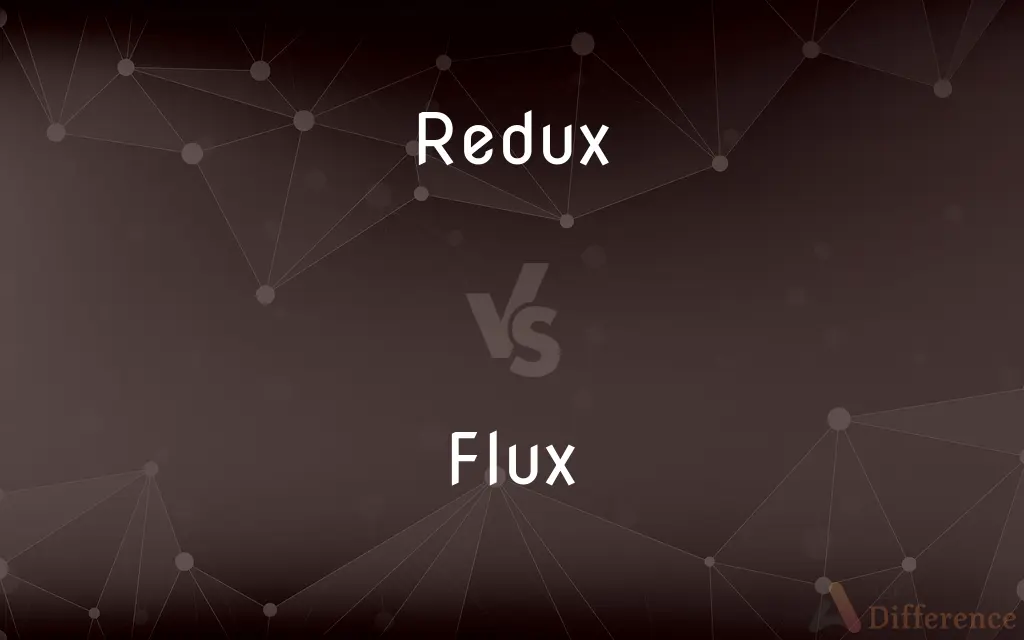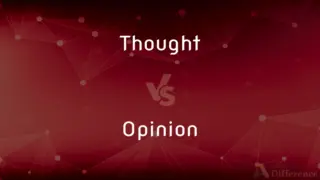Redux vs. Flux — What's the Difference?
Edited by Tayyaba Rehman — By Fiza Rafique — Updated on April 16, 2024
Redux centralizes application state management in a single store, streamlining data flow; Flux uses multiple stores, allowing more flexibility but increasing complexity.

Difference Between Redux and Flux
Table of Contents
ADVERTISEMENT
Key Differences
Redux adopts a single-store architecture where all application state is centralized, making state management predictable and consistent. In contrast, Flux utilizes multiple stores, each managing a specific domain of the app’s state, which can lead to more tailored but complex state management strategies.
While Redux relies on immutable state and pure functions to ensure predictability and facilitate debugging, Flux allows stores to handle their own logic, which can sometimes result in more dynamic but harder-to-track changes.
Redux enforces a strict unidirectional data flow where actions are dispatched, leading to state updates via reducers, which then update the UI. On the other hand, Flux has a more flexible dispatch mechanism, where actions can update multiple stores, and changes propagate through event listeners.
In Redux, all changes must pass through the reducer functions, ensuring that state transitions are easy to track and replay. Flux, however, uses a broadcast mechanism from stores after updates, which can complicate understanding the exact flow of data.
Redux provides powerful developer tools such as time-travel debugging due to its predictable state changes and centralized store. Whereas Flux, with its multiple stores and listener-based updates, often lacks similarly robust tooling support.
ADVERTISEMENT
Comparison Chart
Store Structure
Single store
Multiple stores
State Management
Immutable state management
Mutable state management
Data Flow
Strict unidirectional flow
More flexible, potential for circular updates
Debugging
Enhanced with tools like time-travel
More complex due to multiple sources of truth
Update Mechanism
Reducers process actions to update state
Stores emit changes via event listeners
Compare with Definitions
Redux
A predictable state container for JavaScript apps, facilitating easy state management.
Redux simplifies debugging by enabling time-travel debugging.
Flux
An architectural pattern for building user interfaces, proposed by Facebook.
Flux helps in creating scalable applications by utilizing multiple stores.
Redux
It centralizes application state, making data flow in apps easy to understand.
Managing state in Redux involves a single store which holds all the state of the application.
Flux
Allows more dynamic interactions between actions and stores.
Actions in Flux can trigger updates across several stores, not restricted to a single flow.
Redux
Often paired with React, but can be used with any other JavaScript framework or library.
Redux is a popular choice for state management in complex React applications.
Flux
Employs multiple stores where each store is responsible for a different domain of the application’s state.
In Flux, a typical application might use separate stores for user data and UI state.
Redux
Uses a single unidirectional data flow model.
Data in a Redux application flows in one direction, making it easier to track and manage.
Flux
Utilizes an event-driven mechanism for updating views after store changes.
Stores in Flux emit changes and the corresponding views listen to these changes for updates.
Redux
Emphasizes immutability and pure functions for updates.
State in Redux is updated by pure reducer functions, ensuring new state versions are created rather than modifying existing ones.
Flux
Advocates for unidirectional data flow, though it can be more complex due to multiple stores.
Although Flux also uses unidirectional data flow, managing it across multiple stores can be challenging.
Redux
Brought back; returned. Used postpositively.
Flux
Flux describes any effect that appears to pass or travel (whether it actually moves or not) through a surface or substance. A flux is a concept in applied mathematics and vector calculus which has many applications to physics.
Redux
Redone, restored, brought back, or revisited.
After an unusually cold August, September felt like summer redux as a heatwave sent temperatures soaring.
Flux
The action or process of flowing or flowing out
The flux of ions across the membrane
Redux
A theme or topic redone, restored, brought back, or revisited.
Flux
An abnormal discharge of blood or other matter from or within the body.
Redux
Brought back;
The Victorian era redux
`Rabbit Redux' by John Updike
Flux
Continuous change
Since the fall of the wall Berlin has been a city in flux
The whole political system is in a state of flux
Flux
A substance mixed with a solid to lower its melting point, used especially in soldering and brazing metals or to promote vitrification in glass or ceramics.
Flux
Treat (a metal object) with a flux to promote melting.
Flux
A flow or flowing of a liquid.
Flux
The flowing in of the tide.
Flux
A continuing movement, especially in large numbers of things
A flux of sensation.
Flux
Constant or frequent change; fluctuation
"The constant flux of people and groups ensures that human gene pools will always be mixed" (Steve Olson).
Flux
(Medicine) The discharge of large quantities of fluid material from the body, especially the discharge of watery feces from the intestines.
Flux
The rate of flow of fluid, particles, or energy through a given surface.
Flux
See flux density.
Flux
The lines of force of an electric or magnetic field.
Flux
A substance applied to a surface to be joined by welding, soldering, or brazing to facilitate the flowing of solder and prevent formation of oxides.
Flux
A mineral added to the metals in a furnace to promote fusing or to prevent the formation of oxides.
Flux
An additive that improves the flow of plastics during fabrication.
Flux
A readily fusible glass or enamel used as a base in ceramic work.
Flux
To melt; fuse.
Flux
To apply a flux to.
Flux
To become fluid.
Flux
To flow; stream.
Flux
The act of flowing; a continuous moving on or passing by, as of a flowing stream.
Flux
A state of ongoing change.
The schedule is in flux at the moment.
Languages, like our bodies, are in a continual flux.
Flux
A chemical agent for cleaning metal prior to soldering or welding.
It is important to use flux when soldering or oxides on the metal will prevent a good bond.
Flux
(physics) The rate of transfer of energy (or another physical quantity), especially an electric or magnetic field, through a given surface.
That high a neutron flux would be lethal in seconds.
Flux
(archaic) A disease which causes diarrhea, especially dysentery.
Flux
(archaic) Diarrhea or other fluid discharge from the body.
Flux
The state of being liquid through heat; fusion.
Flux
(transitive) To use flux on.
You have to flux the joint before soldering.
Flux
(transitive) To melt.
Flux
(intransitive) To flow as a liquid.
Flux
(uncommon) Flowing; unstable; inconstant; variable.
Flux
The act of flowing; a continuous moving on or passing by, as of a flowing stream; constant succession; change.
By the perpetual flux of the liquids, a great part of them is thrown out of the body.
Her image has escaped the flux of things,And that same infant beauty that she woreIs fixed upon her now forevermore.
Languages, like our bodies, are in a continual flux.
Flux
The setting in of the tide toward the shore, - the ebb being called the reflux.
Flux
The state of being liquid through heat; fusion.
Flux
Any substance or mixture used to promote the fusion of metals or minerals, as alkalies, borax, lime, fluorite.
Flux
A fluid discharge from the bowels or other part; especially, an excessive and morbid discharge; as, the bloody flux or dysentery. See Bloody flux.
Flux
The quantity of a fluid that crosses a unit area of a given surface in a unit of time.
Flux
Flowing; unstable; inconstant; variable.
The flux nature of all things here.
Flux
To affect, or bring to a certain state, by flux.
He might fashionably and genteelly . . . have been dueled orfluxed into another world.
Flux
To cause to become fluid; to fuse.
Flux
To cause a discharge from; to purge.
Flux
The rate of flow of energy or particles across a given surface
Flux
A flow or discharge
Flux
A substance added to molten metals to bond with impurities that can then be readily removed
Flux
Excessive discharge of liquid from a cavity or organ (as in watery diarrhea)
Flux
A state of uncertainty about what should be done (usually following some important event) preceding the establishment of a new direction of action;
The flux following the death of the emperor
Flux
The lines of force surrounding a permanent magnet or a moving charged particle
Flux
(physics) the number of flux changes per unit area
Flux
In constant change;
His opinions are in flux
The newness and flux of the computer industry
Flux
Move or progress freely as if in a stream;
The crowd flowed out of the stadium
Flux
Become liquid or fluid when heated;
The frozen fat liquefied
Flux
Mix together different elements;
The colors blend well
Common Curiosities
What is Redux?
Redux is a state management library that centralizes application state, facilitating predictable data flow.
What is Flux?
Flux is an architectural pattern used for building stable and scalable user interfaces by employing multiple stores.
Why might a developer choose Redux over Flux?
A developer might prefer Redux for its simplicity, predictability, and robust debugging tools.
How do Redux and Flux differ in store management?
Redux uses a single store for all state management, while Flux uses multiple stores, each managing different aspects of the application’s state.
Why might a developer choose Flux over Redux?
Flux may be preferred for applications that benefit from having multiple, independent stores that manage different domains of the application state.
Can Flux be used with frameworks other than React?
Yes, while Flux was designed by Facebook specifically for React, it can technically be adapted for use with other JavaScript frameworks.
How do Redux and Flux handle actions differently?
In Redux, actions are processed by reducers to update the state, whereas in Flux, actions may cause multiple stores to update independently.
What are the debugging differences between Redux and Flux?
Redux’s centralized and immutable approach to state management makes it easier to use advanced debugging tools like time-travel debugging; Flux’s multiple store approach can complicate debugging.
Can Redux be used with frameworks other than React?
Yes, Redux can be integrated with any JavaScript framework or library, although it is most commonly used with React.
How do Redux and Flux support scalability?
Redux supports scalability through consistent state management practices, while Flux supports it by allowing different parts of an app to manage their own state independently.
Share Your Discovery

Previous Comparison
Thought vs. Opinion
Next Comparison
Lotion vs. NotionAuthor Spotlight
Written by
Fiza RafiqueFiza Rafique is a skilled content writer at AskDifference.com, where she meticulously refines and enhances written pieces. Drawing from her vast editorial expertise, Fiza ensures clarity, accuracy, and precision in every article. Passionate about language, she continually seeks to elevate the quality of content for readers worldwide.
Edited by
Tayyaba RehmanTayyaba Rehman is a distinguished writer, currently serving as a primary contributor to askdifference.com. As a researcher in semantics and etymology, Tayyaba's passion for the complexity of languages and their distinctions has found a perfect home on the platform. Tayyaba delves into the intricacies of language, distinguishing between commonly confused words and phrases, thereby providing clarity for readers worldwide.















































